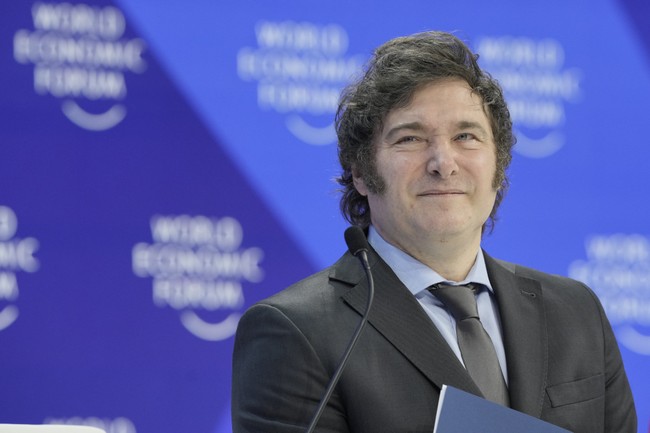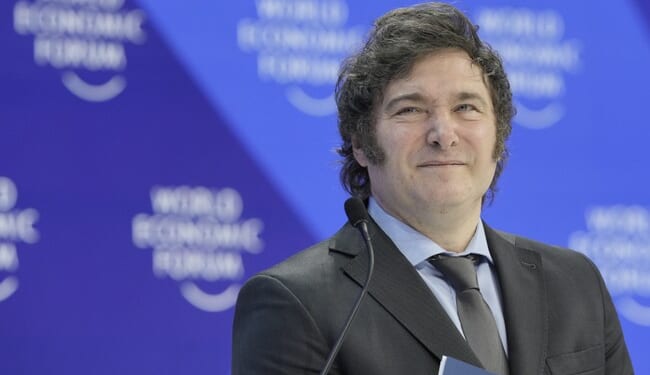
Argentina actually elected a libertarian president.
Javier Milei campaigned with a chainsaw, promising to cut the size of government.
Argentina’s leftists had so clogged the country’s economic arteries with regulations that what once was one of the world’s richest countries is now one of the poorest.
Inflation is more than 200%.
People save their whole lives — and then find their savings worth nearly nothing.
They got so fed up they did something never done before in modern history: they elected a full-throated libertarian.
Milei understands that government can’t create wealth.
He surprised diplomats at the World Economic Forum this month by saying, “The state is the problem!”
He spoke up for capitalism, “Do not be intimidated by the political caste or by parasites who live off the state … If you make money, it’s because you offer a better product at a better price, thereby contributing to general well-being. Do not surrender to the advance of the state. The state is not the solution.”
Go, Milei! I wish current American politicians talked that way.
In the West, young people turn socialist. In Argentina, they live under socialist policies. They voted for Milei.
Sixty-nine percent of voters under 25 voted for him. That helped him win by a whopping 3 million votes.
He won promising to reverse “decades of decadence.” He told the Economic Forum, “If measures are adopted that hinder the free functioning of markets, competition, price systems, trade and ownership of private property, the only possible fate is poverty.”
Right.
Poor countries demonstrate that again and again.
The media say Milei will never pass his reforms, and leftists may yet stop him.
But already, “He was able to repeal rent controls, price controls,” says economist Daniel Di Martino in my new video. He points out that Milei already, “Eliminated all restrictions on exports and imports, all with one sign of a pen.”
“He can just do that without Congress?” I ask.
“The president of Argentina has a lot more power than the president of the United States.”
Milei also loosened rules limiting where airlines can fly.
“Now (some) air fares are cheaper than bus fares!” says Di Martino.
He scrapped laws that say, “Buy in Argentina.” I point out that America has “Buy America” rules.
“It only makes poor people poorer because it increases costs!” Di Martino replies, “Why shouldn’t Argentinians be able to buy Brazilian pencils or Chilean grapes?”
“To support Argentina,” I push back.
“Guess what?” Says Di Martino, “Not every country is able to produce everything at the lowest cost. Imagine if you had to produce bananas in America.”
Argentina’s leftist governments tried to control pretty much everything.
“The regulations were such that everything not explicitly legal was illegal,” laughs Di Martino. “Now … everything not illegal is legal.”
One government agency Milei demoted was a “Department for Women, Gender and Diversity.” DiMartino says that reminds him of Venezuela’s Vice Ministry for Supreme Social Happiness. “These agencies exist just so government officials can hire their cronies.”
Cutting government jobs and subsidies for interest groups is risky for vote-seeking politicians. There are often riots in countries when politicians cut subsidies. Sometimes politicians get voted out. Or jailed.
“What’s incredible about Milei,” notes Di Martino, “Is that he was able to win on the (SET ITAL)promise(END ITAL) of cutting subsidies.”
That is remarkable. Why would Argentinians vote for cuts?
“Argentinians are fed up with the status quo,” replies Di Martino.
Milei is an economist. He named his dogs after Milton Friedman, Murray Rothbard and Robert Lucas, all libertarian economists.
I point out that most Americans don’t know who those men were.
“The fact that he’s naming his dogs after these famous economists,” replies Di Martino, “shows that he’s really a nerd. It’s a good thing to have an economics nerd president of a country.”
“What can Americans learn from Argentina?”
“Keep America prosperous. So we never are in the spot of Argentina in the first place. That requires free markets.”
Yes.
Actually, free markets plus rule of law. When people have those things, prosperity happens.
It’s good that once again, a country may try it.

